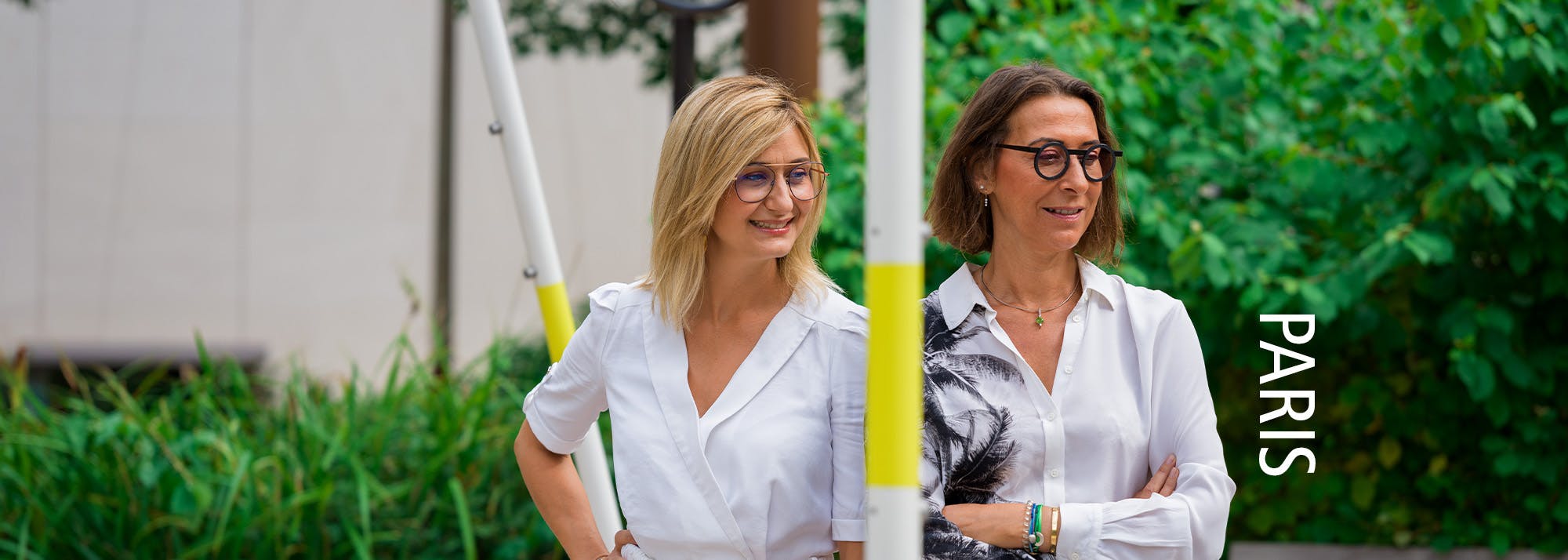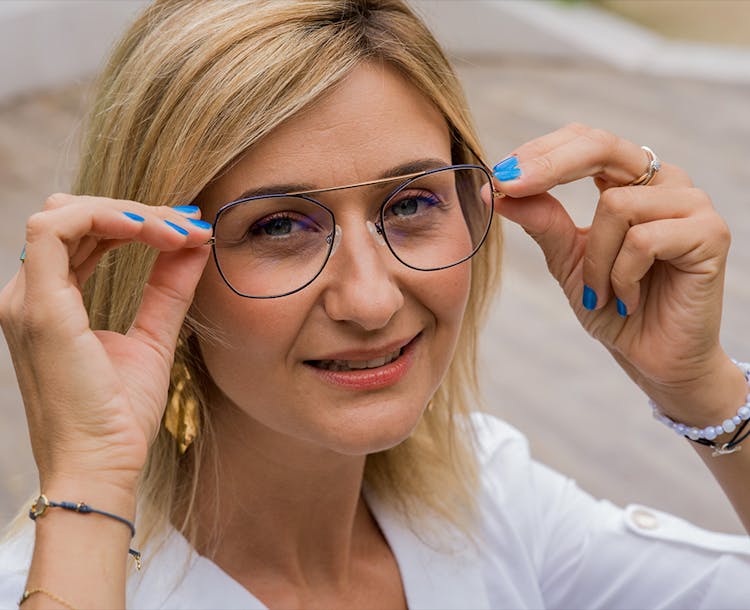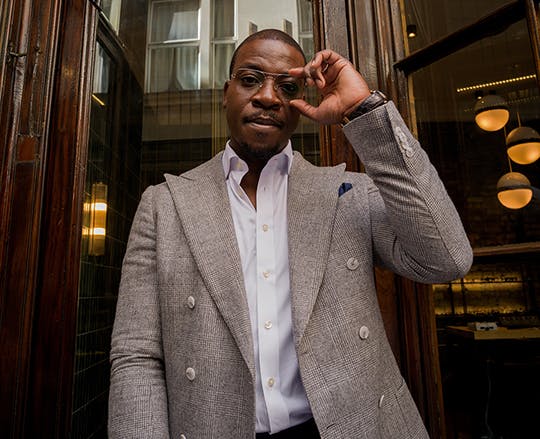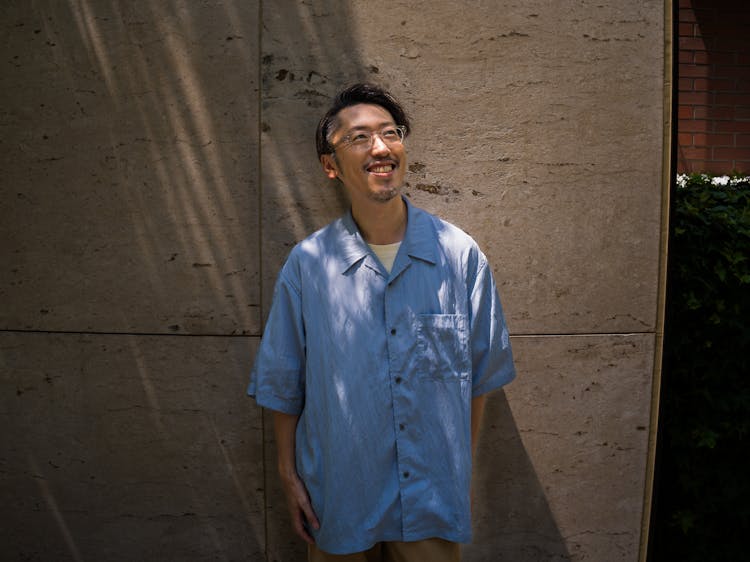Araceli & Cécile
Araceli: If I summarise Nikon Lenswear in 3 words, it would be "Trust, Quality, and Technology."
Cécile: For me, it would be "Reliability, Innovation and Performance." I’ve been working with Nikon Lenswear for over 25 years—since I started. And that won’t change any time soon, that’s for sure.

Making Vision Care Accessible: Helping You See Better, Live Better
At their independent optical store, Araceli and Cécile are redefining the vision experience. Their goal is to create an inviting space where anyone can explore vision solutions without hesitation. By sharing knowledge, offering diverse products, and making vision solutions approachable, they empower customers to make informed choices.
Cécile: With athletes specifically, different lens colours are suitable for different activities. We use a different colour for the tennis player who plays on clay, or on the contrary, a golfer who plays on the lawn. We show athletes how certain shades will make the ball stand out better or make the contrast of the field clearer.
Araceli: Our customers wear glasses on their noses all day long. So, you really have to take the time to detail the different geometries, the different options, the different opportunities that are available to customers so that they can choose the most efficient solution. And it takes almost as long to choose a lens as it does to choose a frame.
Cecile: The lens is important because we know that they will keep these glasses for an average of two years. So, the goal is that it doesn't come back after 15 days with scratches on it. Of course, we offer customers different treatments and explain which lenses will resist better over time according to their lifestyle. For example, if they throw their glasses in the bottom of their bag, they’ll be more fragile, but with certain treatments, they can increase their chances of keeping the glasses for longer.
Araceli: We really take into account their profession, their posture, even their body. For example, if there are two people with the same prescription, but one of them is tall with long arms, we won’t recommend the same type of lens to them as a smaller person with shorter arms. The person with shorter arms looks at things from a closer distance.
Cécile: Everyone from the age of 5 to the elderly are using screens these days. So, we talk about blue light, whether internal to the material or on the surface. And we also talk about tints for the sun or the different colours of lenses. There are so many options. By asking our customers a lot of questions to figure out their needs, we can guide them towards the right lens treatment.
Araceli: People come to the store thinking that the correction prescribed by the doctor will be enough to meet their needs. They don't imagine that the lens technology is just as important as the prescription. Today, we’re talking about visual stress more. And even if the customer doesn’t know the term “visual stress” when they arrive, after talking, they might realise that it’s what they have, and they hadn’t been aware of it.
Cécile: We have a lot of displays and other things to explain the technology to them. For example, when they have a very strong prescription, we can explain the technology behind the lens and give them a nicer result. If the customer leaves with ordinary lenses, they often won’t be happy with their spectacles. We have a lot of techniques to help our customers make the choice and to explain what kind of spectacle lenses we’re going to give them.
Araceli: We wanted a store concept where people want to enter the store for spectacle lenses, but also for other things. We really wanted to be close to the customers.
Cécile: Our shop is independent, meaning we work with the brands we want and the objects we like. Whatever we want and wish for. So, unlike other brand stores, we have more offerings in terms of frames and what we can do.
Araceli: 7 out of 10 adults wear spectacle lenses. But most of them only go to opticians when they have a prescription. Customers almost have to justify themselves by announcing that they have a prescription. Here, our idea is that anyone can open the door to our store.
Cécile: We sell items other than just frames and lenses. We sell different small items, jewelry, handbags, and whatnot. A bit like a concept store, so that people want to come in even if they aren’t coming to buy spectacle lenses.
What makes Nikon Lenswear special?
Araceli: I like the quality of their lenses. Now, I don't have a very big correction, so I haven’t tested all the lenses. Therefore, customer feedback is super important to me for that reason. And the feedback I get is really great. One of my nearsighted customers loves Nikon Spectacle Lenses because of the visual comfort. Their lenses are thin, lightweight, and optimised.
Cécile: I love Nikon Spectacle Lenses because they’re ultra transparent and I believe that the treatments are really well done. I've had my glasses for almost a year now, but I haven't had any scratches. And I find that the lenses really last over time and they’re super clear.
Why did you choose to work with Nikon Lenswear?
Araceli: Before opening this store, I had worked with Nikon Lenswear for almost 20 years. I’ve always been very satisfied with the quality of the products. And also because the Nikon Lenswear brand speaks to people—they’re a guarantee of quality.
Cécile: Yes, I totally agree. In terms of choice, I’ve been working with Nikon Lenses for over 25 years—since I started. And that won’t change any time soon, that’s for sure.
How would you describe Nikon Lenswear in three words?
Araceli: Trust, quality, and technology.
Cécile: Reliability, innovation, performance.



What makes Nikon Lenswear special?
"I love Nikon Spectacle Lenses because they’re ultra transparent and I believe that the treatments are really well done. I've had my glasses for almost a year now, but I haven't had any scratches. And I find that the lenses really last over time and they’re super clear." - Cécile
How does vision impact your daily life?
Araceli: I like to marvel at the sunrise in the morning, at the sunset in the evening, at the moon lighting up the night. What I see transmits emotions to me. That feeling doubles when I take my son to school in the morning, and he has the same type of reaction as me, like, "Look, Mom, the sky! It's so beautiful!”
I also dance with my partner and he loves to spin me around. It's important to have good focus, because if you don't have good focus, you can't spin. Each time, he adds more rounds. We're at eight. Not bad—you already need good focus for that. When we break that record, I’ll let you know.
Cécile: I wear progressive lenses. Every morning, I'm happy to be able to put on my glasses to see what I'm doing: to look at my phone, look at the time, look at everything I have to do for my daily work, since we work with small screws and very small things. For me, wearing my progressive lenses and being completely satisfied with them—that’s happiness.
ㅤㅤㅤㅤㅤㅤㅤㅤㅤㅤㅤㅤㅤㅤㅤㅤㅤㅤㅤㅤㅤㅤㅤㅤㅤㅤㅤㅤㅤㅤㅤㅤㅤㅤㅤㅤㅤㅤㅤㅤㅤㅤㅤㅤㅤㅤㅤㅤㅤㅤㅤㅤㅤㅤㅤㅤㅤㅤㅤㅤㅤㅤㅤㅤㅤㅤㅤㅤㅤㅤㅤㅤㅤㅤㅤㅤㅤㅤㅤㅤㅤㅤㅤㅤㅤㅤㅤㅤㅤㅤㅤㅤㅤㅤㅤㅤㅤㅤㅤㅤㅤㅤㅤㅤㅤㅤㅤㅤㅤㅤㅤㅤㅤㅤㅤㅤㅤㅤㅤㅤㅤㅤㅤㅤㅤㅤㅤ
Could you tell us about a moment where vision impacted your life?
Araceli: If I had to talk about a specific moment, I would say one morning when we went on an excursion in Cuba. We had to get up at 4am, cross a palm forest, and reach the top of a mountain to be able to see and fully enjoy a sunrise in Cuba. That was truly magical.
Cécile: For me, I think it would be when my daughters were born. Seeing a child's eyes open is the most beautiful moment.
What role do you think vision plays in our emotions?
Araceli: Vision is what surrounds us. It’s what helps us appreciate the simple things in life. Happiness is within reach—it’s next to us. We just have to see it, know how to look at it, and know how to smile at it too, perhaps.
Cécile: As a foodie, I can tell you that if I don't see what's on my plate, I'm not going to enjoy my meal as much. And of course, that's instantaneous.ㅤㅤㅤㅤㅤㅤㅤㅤㅤㅤㅤㅤㅤㅤㅤㅤㅤㅤㅤㅤㅤㅤㅤㅤㅤㅤㅤㅤㅤ

Why are you so passionate about being an optician?
Araceli: It's the ability to enable people to truly live fulfilled lives. I remember one of the most rewarding moments in my career. A long time ago, a little girl came into the store. I don't remember exactly what she needed, but she was a baby. Babies don’t talk, but they have lots of facial expressions. When you put spectacle lenses on a baby's face and they start smiling, that’s the best. And lately, it's funny—maybe it’s generational—but I have clients who put on the spectacle lenses and tell me, "Wow, I feel like I'm seeing in 4K.” It really makes me smile. I think this is really great.
What inspired you to pursue a career in eye care?
Cécile: Well, after pursuing my bachelor’s, and then spending a year studying science at a university that wasn’t really for me, I wanted to redirect myself to something more concrete. One of my parents' friends was an optician. He explained his job to me a bit. I knew it was for me. And indeed, today, I don't regret it because I love my job.
Araceli: To tell the truth, like many people, I didn't know what to do. But I knew what I didn't want to do. And I absolutely didn’t see myself working in an office, behind a computer all day. During a third-year internship, I was told, “It would be good for you to do an internship. Why not optics?” And the rest is history.ㅤㅤㅤㅤㅤㅤㅤㅤㅤㅤㅤㅤㅤㅤㅤㅤㅤㅤㅤㅤㅤㅤㅤㅤㅤㅤㅤㅤㅤㅤㅤㅤㅤㅤㅤㅤㅤㅤㅤㅤㅤㅤㅤㅤㅤㅤㅤㅤㅤㅤㅤㅤㅤㅤㅤㅤㅤㅤㅤㅤㅤㅤㅤㅤㅤㅤㅤㅤㅤㅤㅤㅤㅤㅤㅤㅤㅤㅤㅤㅤㅤㅤㅤㅤㅤㅤㅤㅤㅤㅤㅤㅤㅤㅤㅤㅤㅤㅤㅤㅤㅤㅤㅤㅤㅤㅤㅤㅤㅤㅤㅤㅤㅤㅤㅤㅤㅤㅤㅤㅤㅤㅤㅤㅤㅤㅤㅤㅤㅤㅤㅤㅤㅤㅤㅤ
What would you say to someone who wants to become an optician?
Araceli: I would say that it’s an excellent idea. An optician’s job isn’t just to be a simple salesman. It requires training and technical knowledge. I also think that as an optician, we still have a duty and a mission: prevention. We protect our children with sunglasses when we go in the sun, and our mission is to prevent myopia. We know that it is a pathology. It comes at a fairly high speed, and we must know how to slow down this disease.
Cécile: When a young person tells me they want to become an optician, I always tell them, “Go for it.” It’s such a beautiful job, it’s rewarding. We do very different things all day long: reception, choosing a frame with the customer, choosing the glass, doing the assembly afterwards, delivering the spectacle lenses, checking up on the customer. If they come back, that’s the best. When I see the same customer come back ten times in a row, of course, it’s rewarding.








